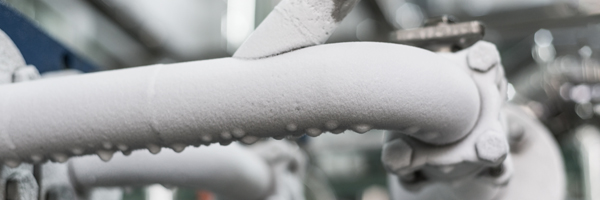
It’s important to protect your commercial property from winter weather. Frozen pipes are among the most common property claims among business owners and can have a huge financial impact on your business. Not only is the cost of repairing broken pipes high, but frozen pipes can interfere with production and day-to-day operations – making it even more costly. Know the causes and follow these precautions to reduce the risk of frozen pipes at your business.
What causes frozen pipes?
To protect your business from frozen pipes, it’s important to know what may cause pipes to freeze. Some factors include:
- Lack of insulation
- Location – cold areas of the building
- No water circulating through the pipes
Pipes are more likely to freeze when the outside temperature drops to 20 degrees or lower. In the Midwest, temperatures often fall below this threshold during winter months – increasing the likelihood of pipes freezing if steps aren’t taken to prevent this loss.
What are some consequences of frozen pipes?
Many problems arise if pipes freeze. The first is having no access to running water in your building. Should a pipe freeze, your employees and customers may be left without water, which can significantly impact business operations.
Another potential consequence is pipe damage. When a pipe freezes, the built-up water pressure could cause the pipe to burst. Frozen pipes will not thaw on their own – they need to be properly dealt with to avoid bursting. The longer they are left frozen, the more likely they are to burst and cause damage to your business.
A third consequence of frozen pipes is water damage. When pipes burst, it can cause severe damage to the building’s floors, walls, ceilings and furniture. Water damage repair can be a costly expense for business owners.

Learn about our
Business Insurance
How to prevent frozen pipes in your building?
Follow these steps to protect your pipes from freezing and causing damage to your business:
1. Insulate pipes and building
For long term prevention of frozen pipes, be sure to insulate your entire building. Consider places that may be overlooked – closets, crawl spaces, attics, warehouses, and other isolated areas. Ensure that pipes in these areas are well insulated and protected from cold air.
2. Seal any leaks and openings
To prevent cold air from leaking in and freezing pipes, you should seal all windows, doors and other openings on the exterior walls of your building. Caulk and insulate the gaps to prevent cold air leaks.
3. Drain any pipes that are not needed during the winter months
If there is an area in your building not in use during winter months, it is good to drain water pipes in those areas to prevent freezing. You may also want to consider some other ways to maintain portions of your property that are not in use, such as a seasonal storage room.
4. Keep a consistent temperature in the building
Always keep the thermostat set to at least 55 degrees during the day and at night. Even if your business is closed or temporarily vacant, it’s important to keep the building’s internal temperature set to at least 55 degrees at all times. Consider opening cabinet doors to expose pipes to warm air. You may also want to consider installing a temperature monitoring system that can alert you if the temperature drops below 55 degrees.
5. Maintain fire protection and sprinkler systems
Ensure that your building’s sprinkler systems are properly heated to prevent damage to fire protection systems. If heat to the building is lost for any reason, only shut off and drain the sprinkler system as a last resort. Ensuring you have fire protection for as long as possible should be a number one priority.
6. Show employees how to shut off water to the building
Make sure that your employees know how to shut off water to the building and sprinkler system in the event of an emergency. That way, if a pipe bursts, you can avoid further damage to your business.
What to do if your pipes burst
If your pipes do freeze, first determine if the pipe has burst. If it has, turn off the water immediately and contact a licensed plumber. If the pipe has not yet burst, first ensure the building’s temperature is at least 55 degrees then contact a plumber to help locate and thaw frozen pipes.
Integrity Insurance provides Risk Control Services to their commercial insurance customers, including formal safety programs, training and help identifying, analyzing and addressing business’s unique risks.
Contact your local independent agent to discuss your coverage needs and to protect your business with Integrity business insurance.
Disclaimer: This article is for informational and suggestion purposes only. If the insurance policy coverage descriptions in this article conflict with the language in the policy, the language in the policy applies.
Sources:
- Insurance Institute for Business & Home Safety
- Sobieski